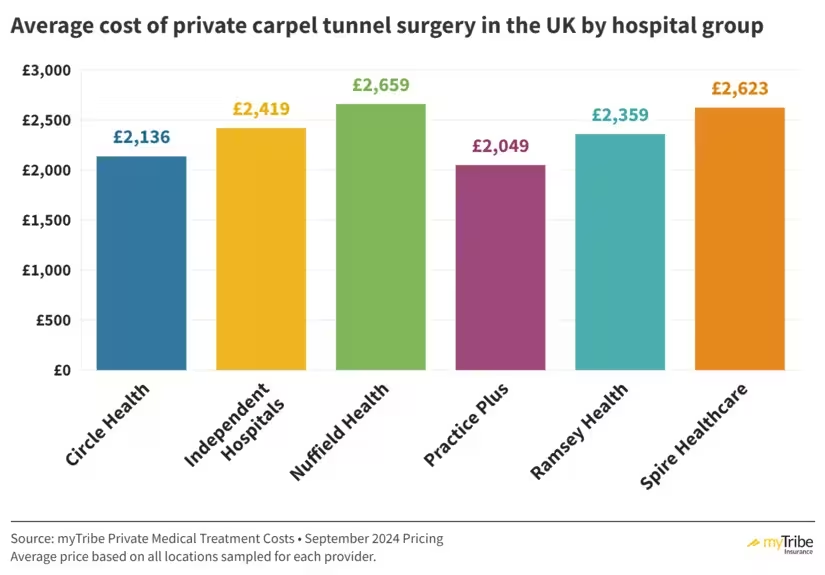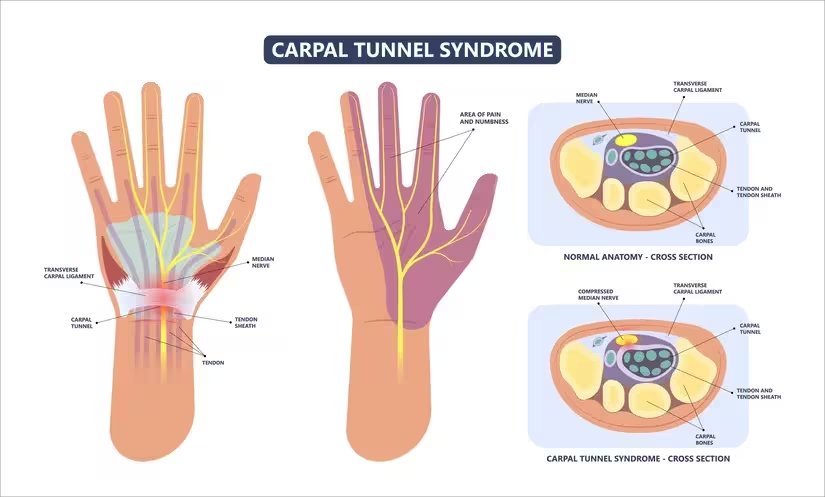How much does private carpal tunnel surgery cost?
Carpal tunnel syndrome can disrupt your work and daily life, causing pain and tingling in your hands and fingers. If you need surgery, you might wonder whether it's worth paying to go private. We explain how carpal tunnel surgery works and examine the advantages of private treatment.
Stuck on a waiting list and looking for treatment?


What is carpal tunnel syndrome?
Carpal tunnel syndrome is caused by pressure on the median nerve in your wrist, also known as carpal tunnel impingement. The carpal tunnel swells and squeezes the nerve, causing pain, tingling, and numbness in your fingers, hand, and wrist. Other symptoms include weakness in your thumb or problems gripping normally.
You're at increased risk of carpal tunnel syndrome if you're overweight, pregnant or have a family history of carpal tunnel syndrome. It can also happen after a wrist injury or if you do repetitive movements or use vibrating tools at work.
Why might you need carpal tunnel release surgery?
Mild carpal tunnel syndrome can resolve on its own. You can treat carpal tunnel syndrome yourself by doing hand exercises, wearing a wrist splint or changing your activities. Painkillers can help but don't typically address the underlying cause.
NHS guidelines recommend seeing your GP if symptoms don't improve or start getting worse. They may refer you for nerve conduction studies, MRI or ultrasound scans to confirm the diagnosis. Your GP may also recommend a steroid injection. These can relieve symptoms but don't always provide a long-term solution.
If these treatments don't help, your GP will refer you to a consultant to discuss surgery. You'll have an initial consultation, and the surgeon may request further diagnostic tests to confirm the diagnosis before discussing carpal tunnel surgery's risks and benefits with you.
The NHS provides carpal tunnel surgery, or you can pay for private treatment. The process begins with a GP referral. You can ask your GP for a private referral if you're happy to pay for your initial consultation. Alternatively, you can see a consultant via the NHS and then explore private carpal tunnel release surgery afterwards.
You'll receive high-quality care whether you choose NHS or private surgery. However, private treatment has some advantages, which we'll explore here.

Our extensive research in September 2024 found that the average cost of carpal tunnel release surgery is currently £2,411. This typically includes hospital and consultant fees; however, what each hospital offers within their package will vary.
myTribe's researchers conduct research into the average cost of private surgery at least once a year and are tracking the changing price of treatments. Between 2023 and 2024, the average cost of carpal tunnel release surgery in private hospitals has increased by just over 15%, having previously been relatively stable at around £2,000 for several years.
Private medical treatment costs vary due to several factors. Location, number of hospitals providing the treatment, and the cost of consultants in that area all contribute to the cost of your surgery.
Our researchers collected pricing from private hospitals in all 12 regions of the UK, and the below table shows what the average cost is by location:
The most expensive region was Northern Ireland, where the average cost is £2,762, which is £351 above the national average. North West England had the cheapest fees, where the procedure will typically set you back £2,041. Interestingly Scotland and North East Midlands were above the national average, despite running costs likely being lower for private hospitals. London came in below average, at £2,292. However, we didn't manage to get pricing from HCA, which runs numerous central London hospitals.
Many of the hospitals we obtained pricing from are part of a bigger group, namely Circle Health, Nuffield Health, Practice Plus Group, Ramsey Health and Spire Healthcare. Alongside those, our researchers gathered pricing from independent private hospitals.
The chart below shows how each private hospital group compared prices for Carpal Tunnel Release surgery.

You may have little choice regarding which private hospital you use, but for those who can look at several options, hopefully, this comparison helps.
Hopefully, we've given you a rough idea of the price you can expect to pay for carpal tunnel surgery in your area. There are three main ways to fund private surgery.
To learn more about health insurance, read our guide to the best medical insurance providers in the UK.

Carpal tunnel surgery is typically carried out as a day case, so you won't usually need an overnight stay in the hospital. Here's what you can expect to happen before, during and after your carpal tunnel surgery.
Before your operation
Before your carpal tunnel surgery, you'll need to remove rings, nail varnish, and false nails. It's also worth preparing your home in advance. After surgery, your grip will be impaired, so consider what help your family and friends can provide. You could also loosen lids ahead of time.
Your surgeon will take a medical history before your operation. If you take medication regularly, they'll advise you if you need to stop. For example, anticoagulants can impact healing, so you may need to stop taking them a few days before surgery.
The surgery
Carpal tunnel release surgery is usually done under local anaesthetic, so an anaesthetist will give you a local anaesthetic injection to numb the area. The surgeon will check whether the anaesthetic has taken effect before beginning. You can choose whether to lie down or sit up during the operation, whichever makes you feel comfortable. The surgeon will place your arm on a board to keep it steady. They may also apply a tourniquet.
Open carpal tunnel surgery involves making a cut near the bottom of your palm. The surgeon then uses a specially designed knife to divide your carpal ligament, widen the carpal tunnel and relieve the impingement on your median nerve.
Finally, the incision is closed using stitches and dressed with a bandage to protect the wound while it heals.
Care in hospital
After your operation, you can generally go home the same day as soon as you feel ready. The effects of the local anaesthetic should wear off after a few hours, but you might still have some numbness in your hand the following day.
Before you leave the hospital, a nurse will advise you on how to care for your wound. You'll have a bandage on your hand to protect the wound, but you should still be able to move your fingers, so let your medical team know if it feels too tight.
You won't be able to drive home, so book a taxi or ask a friend or family member to give you a lift.
Going home and post-operative checks
After your surgery, be careful not to knock your hand and protect it from anything hot. You might need some pain relief as the anaesthetic wears off, so take paracetamol or ibuprofen if needed. Keeping your arm up can help to reduce swelling. Moving your fingers encourages good blood flow, which can help with healing.
You'll need to keep your stitches dry for about a week after surgery. When bathing or showering, you can protect your wound with rubber gloves or a plastic bag.
Carpal tunnel surgery leaves a scar that will look lumpy at first and will feel tender for a few weeks. If you feel comfortable, you can massage your scar with moisturising cream. Most people recover within 6-12 weeks, but it can take longer if you have a chronic health condition or particularly severe symptoms.
Possible symptoms after surgery
You might feel uncomfortable after surgery and may feel some tingling in your hand and fingers as you recover. These sensations are entirely normal. Your grip will also get stronger gradually, so you must do your exercises to help strengthen your hand.
However, if you experience any signs of infection, you should contact your GP immediately. These can include discharge, an unpleasant smell coming from the wound, or redness that spreads around the wound. You may get a temperature or find that the area around the wound becomes hot. You should also be aware of the signs of sepsis. These can indicate a deeper infection, which can become life-threatening. If you experience extreme shivering, difficulty breathing, slurred speech, confusion or a rash that doesn't fade if you roll a glass over it, call 999.
Possible complications
All surgical procedures carry some risk. Carpal tunnel release surgery can cause bleeding under the skin, and your scar will be tender as it heals. Most patients find this fades gradually, but some may experience ongoing sensitivity. There's also a risk of nerve damage.
Some symptoms, such as ongoing pain, are extremely rare but typically benefit from further treatment. Carpal tunnel release surgery usually resolves carpal tunnel syndrome. However, some people need further surgery if the condition returns.
Returning to work
You'll likely need some time off work to recover after your surgery. How long you need depends on your recovery time and your work. If you have a desk-based job or can switch to lighter duties, you may only need a couple of weeks. However, you may need longer if your work involves heavy lifting or manual labour.
You should avoid heavy lifting or repetitive tasks. Using the phone or typing is okay if mixed with other activities that don't strain your hands, but typing for hours at a time could be a problem. Always follow your doctor's advice.
Driving
Your surgeon will tell you when it's safe to start driving after your operation. You must be able to move your hand and wrist freely and grip the steering wheel securely. Pain or tiredness can affect your concentration while driving. Check whether your insurance provider will cover you, as each has its own rules on driving after surgery.
It's a good idea to build up gradually, with short journeys, before attempting longer drives.
MyTribe guides are designed to help you learn more about medical treatment and understand your private healthcare options. If you'd like to learn more about how private health insurance can help you access carpal tunnel surgery or other private treatment, contact us for a comparison quote. We'll connect you with a regulated broker for tailored advice.
What our readers say
We are rated Excellent on Google from 150+ reviews. Our reviews relate to the service provided by both myTribe and its partners.
Disclaimer: This information is general and what is best for you will depend on your personal circumstances. Please speak with a financial adviser or do your own research before making a decision.
Frequently Asked Questions
What is carpal tunnel syndrome?
Carpal tunnel syndrome occurs when the carpal tunnel swells and compresses the median nerve, causing pain, tingling and numbness in your fingers, hand and wrist. If treatments such as wrist splints, exercises and steroid injections don't help, you may need carpal tunnel release surgery.
How can I get back to normal activities after carpal tunnel surgery?
After surgery, a physiotherapist will give you a hand therapy program to build your strength. While you should avoid heavy lifting after surgery, you should gradually be able to return to normal activities.
Start with light activities such as holding a glass or book, and build up to more strenuous activities as your hand strengthens.
Can I fly after carpal tunnel surgery?
Firstly, check with your surgeon to see whether it's safe to fly. Airlines have regulations governing air travel after surgery, so check before you book. Surgery can also affect your travel insurance coverage, so check with your insurance company to see if there are any restrictions.












